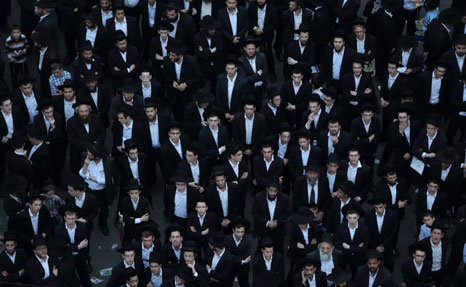Misery Loves Company
In light of their demographic growth, the ultra-Orthodox community in Israel have to attempt to become part of in the broader Israeli society.

Flash 90
Are there any prices to be paid for the solidarity and cohesion of a clearly defined and isolationist community? Is it possible that supporting community’s weak and needy also comes with undesirable byproducts, in terms of the "the public interest" and a shared good? Israel's economic newspaper, the Marker, recently published a study, packed with data, praising the ultra-Orthodox sector in Israel for its resilience and good health, and noting that 70% of the ultra-Orthodox are satisfied with their economic status, even though the community is characterized by widespread poverty, with most families living on a below average income. The article refers to these data as sociological-economic "magic;" they stem from the mutual responsibility and solid communitarianism that typifies parts of the ultra-Orthodox sector in Israel.
Undisputedly, the values of helping others and norms of reciprocity are characteristic of ultra-Orthodox society and serve as its moral and social compasses. This emerges from the data the Israel Democracy Institute's 2018 Yearbook of ultra-Orthodox Society in Israel, which shows that 35% of this sector engage in volunteering, a significantly higher number than in other sectors (23%). In addition, giving to charity (tzedakah) is widespread and is very significantly higher than in other sectors. Almost 90% of the ultra-Orthodox reported that they had given a monetary contribution in 2017, as compared to 63% in other sectors. Ultra-Orthodox society can be defined as a culture that reveres the value of making significant financial donations on a regular basis as integral to its way of life. Taken together with a willingness to make do with a lower standard of living and a culture of cautious, measured and frugal consumption all seem to indicate that most ultra-Orthodox families live with dignity and have a sense of a strong, common goal which while bonding them together, also builds higher and stronger walls, separating them from the rest of society.
All these communal characteristics, as well as other indicators, are proof of the social capital prevalent in ultra-Orthodox communities. However, the internal cohesion characteristic of this social capital comes at a price. It is comprised of strong and effective social bonds within the communities themselves, but l does not contribute to the overall cohesion of Israeli society, but rather, first and foremost, serves to meet the needs of the members of these insular religious communities. Thus, internal solidarity within the ultra-Orthodox sector comes at the expense of developing broader civic identities that would promote the overall national, social, and economic resilience which is vital for Israeli society.
Moreover, even the ultra-Orthodox themselves pay an economic price for their insular way of life and for relying solely on internal social bonds. For example, ultra-Orthodox women earn low salaries, due not only to their low level of education or to the fact that many work part time, but also—results from their understandable preference for working within the confines of their community or in a work environment in which they do not interact with other population groups. These women pay a price in that they have limited employment horizons and a glass ceiling, making it difficult for them to break out of the closed ultra-Orthodox economy and enter higher quality jobs.
Thus, the fact that the sense of community diminishes the sense of poverty, does not in itself truly solve the difficulties and challenges facing the ultra-Orthodox sector. These challenges include: poor secular education (lacking core subject in the curriculum such as English, science…) for boys in elementary and high school, difficulties in completing academic studies, and low rates of employment. These challenges call for a fundamental change in the community’s attitudes, so as to create a "common good" for the mutual benefit of the ultra-Orthodox community and society at large, especially the employment market.
In light of the demographic growth of the ultra-Orthodox community in Israel, there is no choice for those of its members, who are interested in finding their place in Israeli society, but to proceed with caution and make the Sisyphean and ongoing attempt to become part of in the broader Israeli society, without doing any harm to their distinct cultural and social character, and still maintaining their affiliation with the core of ultra-Orthodox society which prioritizes insular communal life over shared citizenship.
